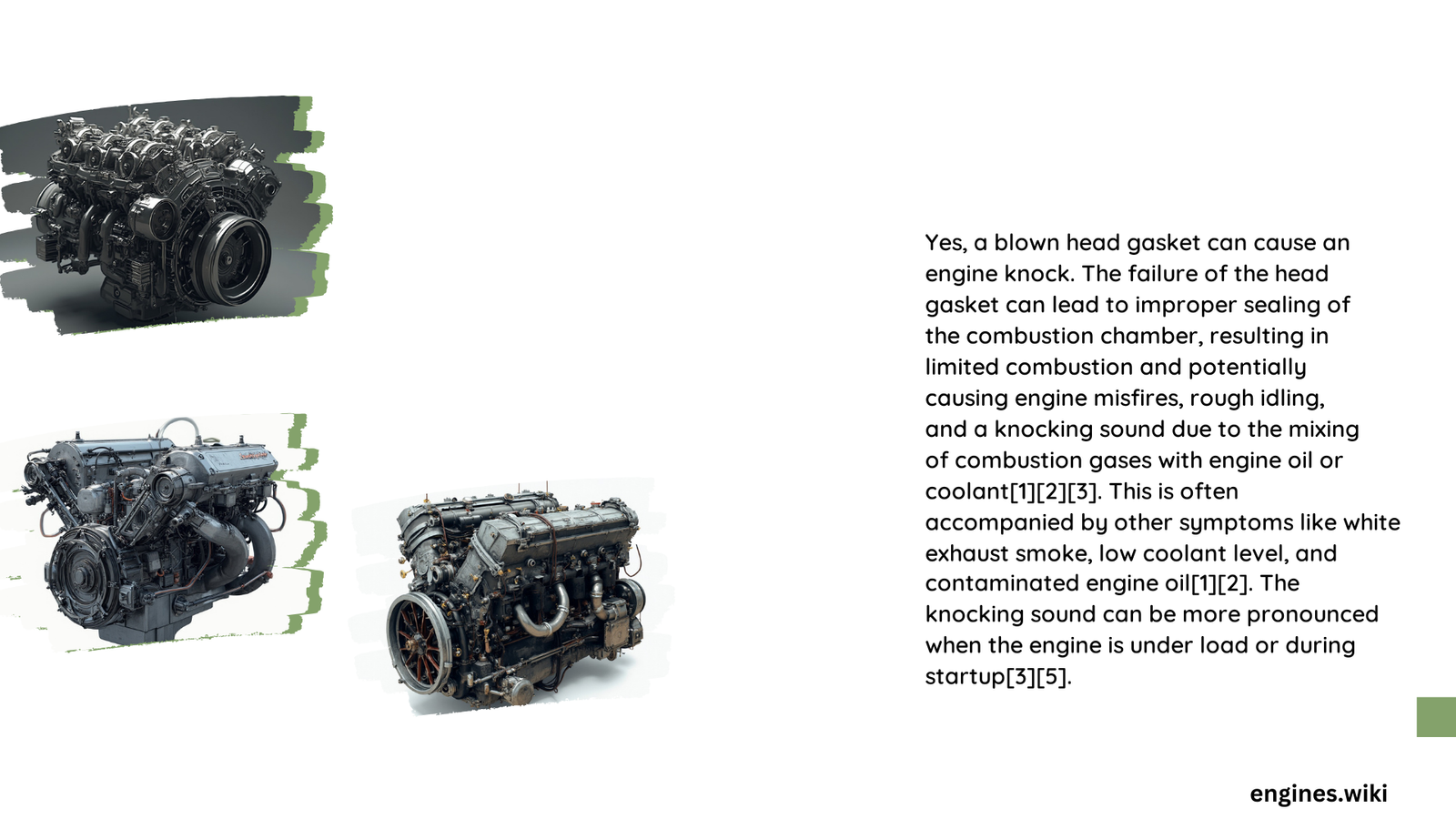A blown head gasket can indeed cause engine knock, leading to serious mechanical issues. This critical component, when compromised, can result in compression loss, coolant and oil leaks, and improper combustion. These problems can manifest as knocking sounds, reduced performance, and potential long-term damage to the engine. Understanding the relationship between a blown head gasket and engine knock is crucial for timely diagnosis and repair.
What Are the Primary Causes of Engine Knock from a Blown Head Gasket?
A blown head gasket can cause engine knock through several mechanisms:
- Compression Loss: When the head gasket fails, it no longer effectively seals the combustion chamber. This leads to:
- Reduced compression in affected cylinders
- Uneven combustion across all cylinders
-
Potential for misfires and irregular engine operation
-
Coolant Leakage: A compromised head gasket can allow coolant to enter the combustion chamber:
- Coolant vaporizes during combustion, creating steam
- Rapid expansion of steam causes knocking or tapping sounds
-
Can lead to pre-ignition or detonation, especially under high loads
-
Oil Contamination: Oil may leak into the combustion chamber or coolant system:
- Improper lubrication can cause increased friction and wear
- Oil burning in the combustion chamber can lead to knocking sounds
- Contaminated oil loses its effectiveness, potentially causing bearing damage
How Does a Blown Head Gasket Affect Different Engine Types?

The impact of a blown head gasket can vary depending on the engine configuration:
| Engine Type | Impact of Blown Head Gasket |
|---|---|
| Inline-4 | – More noticeable power loss due to fewer cylinders – Increased likelihood of overheating – Potential for severe engine damage if left untreated |
| V6 | – May experience uneven performance across cylinder banks – Cooling system issues can be more complex – Repair costs can be higher due to engine design |
| V8 | – Might run smoother initially due to more cylinders – Higher risk of coolant loss and overheating – Potential for significant repair costs |
Regardless of engine type, a blown head gasket requires immediate attention to prevent further damage and ensure proper engine function.
What Are the Precise Symptoms of a Blown Head Gasket That May Indicate Engine Knock?
- White Exhaust Smoke:
- Indicates coolant burning in the combustion chamber
-
Often accompanied by a sweet smell
-
Coolant Loss Without Visible Leaks:
- Consistently low coolant levels
-
Potential for engine overheating
-
Oil Contamination:
- Milky or frothy oil under the oil cap or on the dipstick
-
Indicates mixing of oil and coolant
-
Temperature Fluctuations:
- Erratic temperature gauge readings
-
Frequent overheating episodes
-
Rough Idling and Knocking Sounds:
- Uneven engine performance at idle
- Distinct knocking or tapping noises, especially under load
How Does a Blown Head Gasket Impact Engine Performance?
A blown head gasket significantly affects engine performance in several ways:
- Power Loss:
- Reduced compression leads to decreased power output
-
Noticeable during acceleration or under load
-
Fuel Efficiency Decline:
- Improper combustion results in increased fuel consumption
-
Engine works harder to maintain performance
-
Overheating Issues:
- Compromised cooling system efficiency
-
Can lead to further engine damage if not addressed
-
Increased Emissions:
- Coolant burning in combustion chambers increases harmful emissions
-
May cause failure of emissions tests
-
Long-term Damage Risks:
- Potential for cylinder head warping
- Risk of damage to pistons, cylinder walls, and catalytic converter
What Are the Cost Implications of Ignoring a Blown Head Gasket?
Ignoring a blown head gasket can lead to severe financial consequences:
- Immediate Repair Costs: $1,000 – $2,500 for head gasket replacement alone
- Engine Rebuild: $2,500 – $4,000 if damage extends to other components
- Full Engine Replacement: $4,000 – $8,000 or more in severe cases
- Additional Costs:
- Towing fees
- Diagnostic charges
- Rental car expenses during repair
Early detection and repair of a blown head gasket can significantly reduce these potential costs.
How Can You Prevent Engine Knock Caused by a Blown Head Gasket?
- Regular Maintenance:
- Follow manufacturer-recommended service schedules
-
Keep coolant levels and quality in check
-
Prompt Attention to Warning Signs:
- Address overheating issues immediately
-
Investigate any unusual engine noises or performance changes
-
Use of Quality Parts:
- Install high-quality head gaskets during repairs
-
Use manufacturer-recommended or better-quality coolant
-
Proper Engine Operation:
- Avoid overrevving, especially when the engine is cold
-
Allow proper warm-up time in cold weather
-
Professional Inspections:
- Schedule regular check-ups with a qualified mechanic
- Perform compression tests to detect early signs of gasket failure
By following these preventive measures, you can significantly reduce the risk of a blown head gasket and the associated engine knock issues.
References:
- https://bookmygarage.com/blog/blown-head-gasket-sound/
- https://www.capitolsubaru.com/service/information/5-signs-your-head-gasket-is-blown.htm
- https://www.gmt400.com/threads/head-gasket-between-cylinders-knocking.60773/
